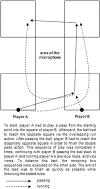Shared Knowledge and Verbal Communication in Football: Changes in Team Cognition Through Collective Training
- PMID: 30766498
- PMCID: PMC6365450
- DOI: 10.3389/fpsyg.2019.00077
Shared Knowledge and Verbal Communication in Football: Changes in Team Cognition Through Collective Training
Abstract
One of the psychological mechanisms that contribute to effective and efficient team actions is team cognition, defined either as shared knowledge states about game situations, teammates' skills, and action probabilities or direct communication processes in the team action itself. Particularly in interactive team sports (e.g., football), characterized by highly complex, dynamic, and uncertain situations, sharing a common understanding concerning potential future actions and how to coordinate these actions may be an advantage. Otherwise, team members must communicate their thoughts and ideas on the fly, which might be impossible due to time pressure, cognitive costs or noisy environments. This study examined if shared knowledge and verbal communication change through collective training. Forty-six under-18 and under-21 youth football players performed a football task in teams of two. The task consisted of passing and running elements common in football. After a training phase, and before two testing phases, players evaluated their actions and the actions of their assigned teammate regarding action type, location, and timing. Out of these evaluations, two indices of common understanding were computed. Furthermore, verbal communication during the task was video-and audio-recorded. Data analysis showed that shared knowledge considerably increased over time and with practice. Simultaneously, overall verbal communication and verbal communication consisting of orienting information was significantly reduced. Additionally, there was a tendency for a correlation that when shared knowledge increased, orienting verbal communication decreased. Overall, the players used orienting communications the most (77%). The study revealed that shared knowledge states and verbal communication change through collective training and that there might be a relation between the level of shared knowledge and the use of orienting verbal communication. Further studies in and off the field are needed to disentangle the complex interplay of team cognitions.
Keywords: collective training; football; shared knowledge; team cognition; team coordination; verbal communication.
References
-
- Blickensderfer E. J., Reynolds R., Salas E., Cannon-Bowers J. A. (2010). Shared expectations and implicit coordination in tennis doubles teams. J. Appl. Psychol. 22 486–499. 10.1080/10413200.2010.507497 - DOI
-
- Cannon-Bowers J. A., Bowers C. (2006). Applying work team results to sport teams: opportunities and cautions. Int. J. Sport Exerc. Psychol. 4 447–462. 10.1080/1612197X.2006.9671807 - DOI
-
- Cannon-Bowers J. A., Salas E., Converse S. A. (1993). “Shared mental models in expert decision making teams,” in Current Issues in Individual and Group Decision Making, ed. Castellan N. J., Jr. (Hillsdale, NJ: Erlbaum; ),221–246.
LinkOut - more resources
Full Text Sources


